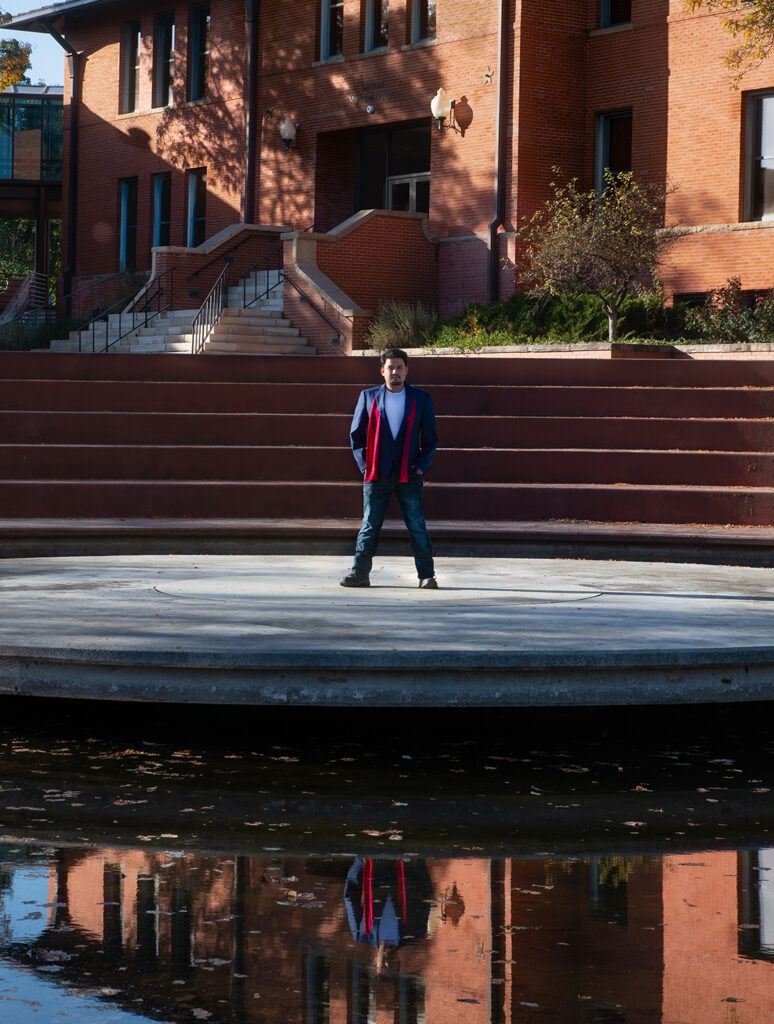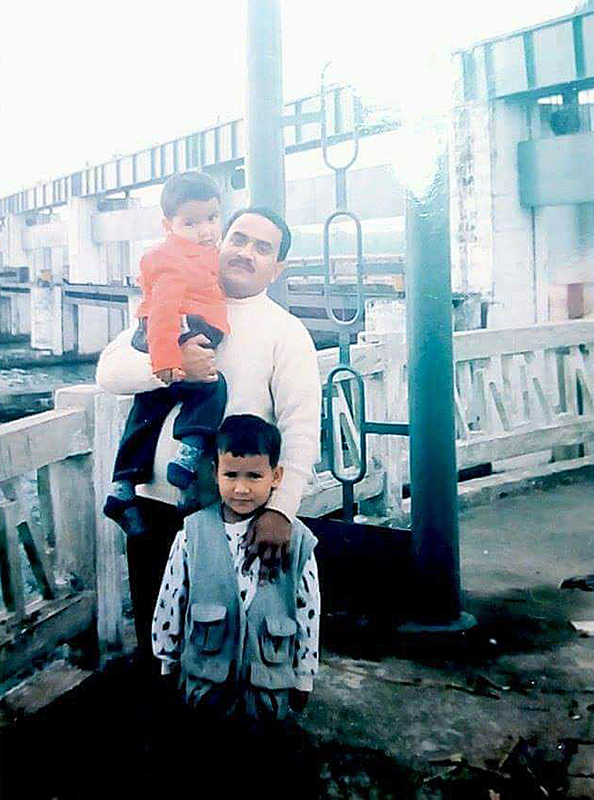AN IMMIGRANT STUDENT’S VIEW
‘The promise of democracy is not always true.’

By Coleman Cornelius | Jan. 3, 2024
Laxman Adhikari has a distinct view of democracy: The CSU Global student grew up in Nepal during a civil war, witnessed the government of his poor country move from monarchy to fragile democracy, and has lived for nearly a decade in the United States as he has worked and completed a college degree.
A successful democracy? It depends on economic opportunity, adherence to a sound constitution, and commitment to representative government, he said.
“There’s still a lot of instability and corruption in Nepal,” said Adhikari, who lived with his parents and younger brother in the cities of Butwal and Kathmandu. “A lot of people are tired because elected politicians have been in power for years and haven’t done anything. It’s worse than the monarchy now. A lot of people wish their king were back.
“Democracy and freedom can mean very different things in different countries,” he added. “There’s a thin line between having freedom and losing discipline, going astray, and hurting the country.”
Adhikari might not be a professional diplomat, but his conclusions echo a strategy for Nepal released in 2022 by the U.S. Department of State. It calls for supporting good governance, democratic values, and national security in Nepal to counterbalance endemic corruption and a faltering transition to a federal democratic republic.
The first 10 years of Adhikari’s life were dominated by a civil war launched when Maoist insurgents sought to establish a communist republic. War roiled the Himalayan country from 1996 to 2006, resulting in widespread death and displacement; a peace accord in 2006 led to a new government, new constitution, and elected parliament, with Maoists controlling many seats. Yet, ongoing political and socioeconomic turmoil have prompted Adhikari and many other young people to depart Nepal in search of education and work to help support their families, he said.
With a U.S. student visa, Adhikari, 27, lives and works in Loveland, Colorado, and studies computer science through CSU Global. He represents the online university on the CSU System Board of Governors, a student leadership position that has inspired Adhikari to pursue graduate education at Colorado State University in Fort Collins after he completes a bachelor’s degree at CSU Global. He hopes to apply his computer science training in the field of artificial intelligence. Adhikari recently discussed his observations of democracy with STATE magazine.
STATE: What was your experience growing up in Nepal during a time of civil war?
ADHIKARI: It was a tumultuous time in the nation’s history. Communist rebels used violent protests and guerrilla warfare, especially in the villages, where there wasn’t a lot of policing. They would give citizens weapons and convince them to rebel against the monarchy and the government of Nepal.
After the royal massacre in 2001, many people felt distraught because of the death of our king. There had been a lot of social, economic, and industrial reforms that promoted the development of Nepal during the reign of King Birendra and his father, King Mahendra, before him. This upward trajectory reversed after the regicide of King Birendra and his family.
After that, the violence increased. It was chaos. Everyone was scared. There were curfews, people marching and protesting in the streets, and fighting with police. The roads were closed, and people burned tires, bikes, and cars. Streets, buildings, offices, and schools were closed. If shops were open, rebels would vandalize them. So, no one in their right mind would open anything. The police would try to control the situation, but they could not. A lot of deaths and war crimes occurred, and there was an economic crisis.
Eventually, there was a peace treaty that allowed the communists to have a role in the government. Politicians promised things to get elected, but when they got into power, they would not do those things. Instead, they reverted to corruption.
STATE: Has the unstable democracy been disillusioning for people in Nepal?
ADHIKARI: Yes, because the promise of democracy is not always true. People lie to get into power, and they will abuse that power. A lot of young people leave to support their families. The economy is based on agriculture, tourism, and remittance – a lot of people’s income comes from going up the road, making money, and sending it back to their families.
I send money to my family whenever I can, and I do not ask my parents for money for college. My dad works as a plumbing and electrical engineer, and he makes $600 a month. It’s decent money in Nepal, but it doesn’t compare to here. If I work as a waiter on busy nights, I’ll make that in two days. So, I try to help as much as I can.
STATE: What is your hope for the governance of your home country?
ADHIKARI: My hope is for Nepal to have committed young people represent the country. Now, even though we say it’s democracy, it doesn’t seem like democracy; it seems more like authoritarianism. If you want to have a true democracy, you must have people who want to do better for the country and create opportunity.

Shown in 2004, Adhikari stands with his father and younger brother in Nepal, where he grew up during wartime. Photo: Submitted.
STATE: Tell me about your observations of democracy in the United States and how it differs from that in Nepal.
ADHIKARI: It’s completely different. In the United States, the Constitution is usually upheld properly. Nepal does have a constitution and a system of governance, but it’s difficult in Nepal to uphold that constitution because of corruption. Here, even though politicians are in conflict and there is ongoing civil unrest and crime in some places, in America many people – normal people – still want to uphold the Constitution.
STATE: The United States has been called a nation of immigrants; at the same time, there’s a lot of anti-immigrant sentiment here. What has your experience been?
ADHIKARI: My experience contrasts drastically having lived in Louisiana and Colorado. In Louisiana, I saw a lot of discrimination and hostility toward immigrants. In Colorado, I haven’t seen a hostile environment. America is so big that you go to a different place, and it’s like a different country. America has people from all over the world. It’s like a melting pot, and there are more benefits to that than drawbacks for a nation to have so much diversity. Democracy should allow people to live freely and to protect their cultures and their families. It should preserve the people of the country.
STATE: Do you think people in the United States take democracy for granted? I ask in part because you described having education and career aspirations that you would not have been able to pursue in Nepal.
ADHIKARI: Yes, some people do take the level of life they are able to live here for granted. It’s a complicated topic, but some people do take the freedoms here for granted.
Photo at top: Laxman Adhikari is a first-generation college student and is the CSU Global student representative on the Board of Governors of the CSU System. Photo: Mary Neiberg
SHARE
